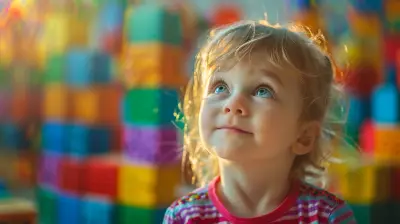Teaching Your Child the Power of Self-Awareness
1 September 2025
As parents, we naturally want our children to grow into kind, confident, and emotionally intelligent individuals. But how do we help them navigate their emotions, understand their actions, and build strong relationships? The answer lies in self-awareness.
Self-awareness is the foundation of personal growth. It helps kids recognize their emotions, understand their strengths and weaknesses, and make better decisions. Teaching your child self-awareness isn’t just about helping them understand themselves—it’s about giving them the tools to succeed in life.
So, how can you guide your child in developing this essential skill? Let’s dive into actionable ways to nurture self-awareness in kids. 
What is Self-Awareness and Why is it Important?
Self-awareness is the ability to recognize and understand one’s own emotions, thoughts, and behaviors. It involves being conscious of what drives our actions and how they affect those around us.For kids, self-awareness leads to:
- Better emotional regulation – They can manage their feelings instead of acting on impulse.
- Improved relationships – When children understand their own emotions, they can relate better to others.
- Greater confidence – Knowing their strengths and weaknesses helps them feel secure in who they are.
- Stronger decision-making skills – Self-aware kids can think before they act, making wiser choices.
Now that we understand its importance, let's look at practical ways to instill self-awareness in children. 
Helping Kids Identify Their Emotions
Before children can become self-aware, they need to recognize and name their emotions.Encourage Emotional Vocabulary
Many young kids struggle to express how they feel simply because they don’t have the words for it. Instead of just saying they feel “bad” or “good,” teach them specific emotions like:- Happy, excited, joyful
- Sad, disappointed, frustrated
- Angry, annoyed, upset
- Nervous, anxious, worried
A fun way to practice this is by using an emotion chart or reading books that describe feelings. The more words they have for their emotions, the easier it will be to manage them.
Model Emotional Awareness
Kids learn by watching us. If you're having a tough day, verbalize it:> "I’m feeling a little frustrated because I forgot something important. I'm going to take a deep breath and try again."
This simple act teaches children that emotions are normal and manageable. 
Encouraging Self-Reflection
Children often act on impulse, reacting without thinking. Self-reflection helps them pause and understand why they feel or act a certain way.Ask Open-Ended Questions
Instead of asking yes/no questions, encourage deeper thinking:- “What made you feel that way?”
- “What could you do differently next time?”
- “How did your actions affect others?”
This encourages kids to explore the why behind their emotions and behaviors.
Journaling or Drawing Feelings
Not all kids are comfortable talking about their emotions. A feelings journal or drawing activity allows them to express themselves privately.Encourage them to write or draw about:
- A situation that made them happy
- A time they felt angry and how they handled it
- Something they are proud of
This practice builds self-reflection without pressure. 
Teaching Empathy and Perspective-Taking
Self-awareness isn’t just about understanding ourselves—it’s also about recognizing how our actions affect others.Role-Playing Scenarios
Acting out different situations helps children understand emotions from another perspective. For example:- Scenario: A friend is feeling left out.
- Question: “How do you think they feel? What could you say to help?”
This practice enhances empathy and strengthens social skills.
Encourage Apologies and Acknowledgment
Instead of forcing a quick “sorry,” help your child understand the impact of their actions.Instead of just saying “Say you’re sorry!” try:
> “I know you didn’t mean to hurt your friend’s feelings. How do you think they felt? What can you do to make it better?”
This helps children connect their actions with emotions and learn from their experiences.
Helping Kids Understand Strengths and Weaknesses
Part of self-awareness is knowing what we’re good at—and where we struggle.Celebrate Their Strengths
Every child has unique talents and abilities. Encourage them to recognize what they do well, whether it’s kindness, creativity, or problem-solving.Try saying:
> “I love how determined you are when you try something new! That’s a great strength.”
This builds confidence and helps them own their abilities.
Normalize Challenges and Mistakes
It's just as important for children to accept their weaknesses. Instead of seeing mistakes as failures, help them see them as learning opportunities.- Instead of: “You’re not good at math.”
- Try: “Math is challenging, but with practice, you’ll improve.”
By creating a growth mindset, kids learn that challenges help them grow rather than define them.
Encouraging Mindfulness and Self-Regulation
Being present and aware of one’s feelings in the moment is a crucial part of self-awareness.Practice Deep Breathing
Teaching kids simple breathing exercises can help them stay calm in stressful situations. A fun method is “balloon breathing”:> Pretend you’re blowing up a big balloon. Take a deep breath in, then slowly blow out.
This technique helps kids regulate their emotions before reacting impulsively.
Teach the “Pause and Think” Rule
Encourage children to pause before they react. If they’re about to lash out in anger, they can practice:- Taking a deep breath
- Counting to five
- Thinking about how their response will affect others
This small habit can make a big difference in emotional self-control.
Creating a Supportive Environment for Growth
Helping a child develop self-awareness isn’t a one-time lesson—it’s an ongoing journey.Praise Effort, Not Just Results
Instead of only celebrating achievements, recognize their efforts:- “I’m proud of how hard you worked on that!”
- “I love that you kept trying even when it was tough.”
This not only builds resilience but reinforces self-awareness of their growth.
Be Patient and Encouraging
Self-awareness is a skill that takes time to develop. Some days, your child might be highly in tune with their emotions, while other days, they may struggle. That’s okay! What matters is that they’re learning and growing at their own pace.Final Thoughts
Teaching your child self-awareness is one of the greatest gifts you can give them. When they understand their emotions, strengths, and challenges, they become more confident, empathetic, and resilient.By practicing emotional recognition, self-reflection, empathy, and mindfulness, your child will develop the skills they need to navigate life with confidence and understanding.
So, start small. Have open conversations, model self-awareness, and create a safe space for your child to express themselves. Over time, you’ll see them grow into a thoughtful, emotionally intelligent individual—ready to take on life with self-assurance.
all images in this post were generated using AI tools
Category:
Emotional IntelligenceAuthor:

Zelda Gill
Discussion
rate this article
1 comments
Maggie Good
This is a wonderful article! Teaching our children self-awareness is such a vital gift. It lays the foundation for their emotional intelligence and helps them navigate the world with confidence.
September 6, 2025 at 4:51 AM

Zelda Gill
Thank you for your kind words! I completely agree—self-awareness is indeed crucial for building emotional intelligence and confidence in children.


